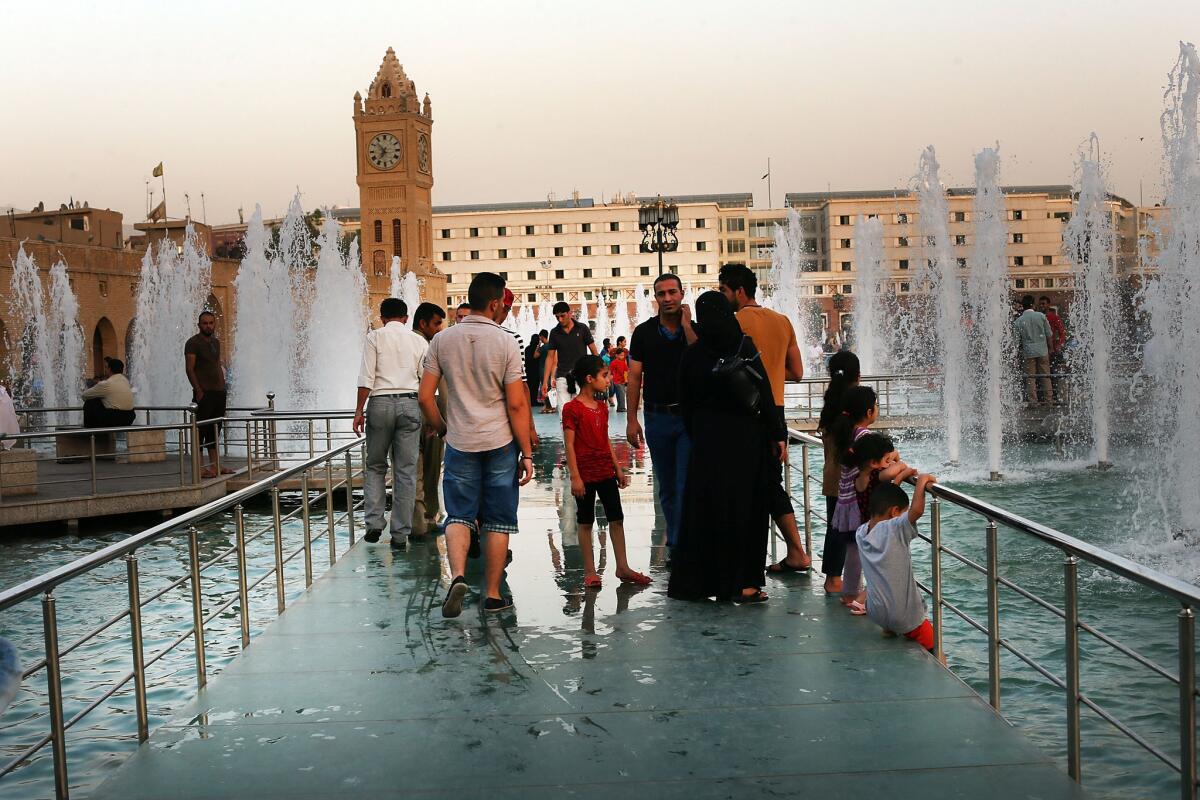Militants behind new ‘caliphate’ fight to hold lands in Iraq, Syria

- Share via
A day after proclaiming rule over the world’s Muslims, fighters for the self-styled Islamic State “caliphate” were battling Monday to retain control of seized territory in Iraq and Syria against resurgent government forces.
The videotaped declaration Sunday of the first transnational caliphate since the collapse of the Ottoman Empire nearly a century ago stirred fear across the Middle East that the Al Qaeda splinter group has amassed enough followers, looted cash and armaments to impose its harsh version of Islamic law on broad swaths of Iraq and Syria.
But the Sunni militant group’s claim to global authority and its demand that the Muslim faithful swear loyalty to its reclusive leader, Abu Bakr Baghdadi, also provoked derision among Islamic scholars and opinion-makers as ludicrous overreaching and a recipe for intensified conflict with its spurned parent, Al Qaeda.
The group known until Sunday as the Islamic State in Iraq and Syria, or ISIS, said it was removing the territorial limitations from its name to reflect its claim to represent the faithful worldwide.
Only a few small Islamist militias have responded with pledges of allegiance to Baghdadi, and no state has recognized the declaration of a faith-based caliphate.
“If the Islamic State is to get people to support it globally, it will need key Muslim scholars to issue fatwas and religious edicts in support,” wrote Al Jazeera analyst Imran Khan in a commentary Monday.
He also noted that Baghdadi has been in a power struggle with Al Qaeda leader Ayman Zawahiri in recent years, and the clash is likely to intensify now that the Islamic State leader is making such a brazen play for authority over global Islamic militant movements.
Al Jazeera quoted Shiite Muslim lawmaker Khalid Assadi in Iraq as dismissing the proclaimed caliphate as “nothing but a wild imagination of a desperate fanatic gang that wants to seize control in a bloody way.” He predicted that the group would eventually lose its grip on the territory it now holds from the suburbs of Aleppo, Syria, through northern and central Iraq.
“The murderers and terrorists in charge of the Islamic State of Iraq and the Levant [as ISIS is also known] have sought to increase their legitimacy by declaring their transitory and horrific domination of parts of Iraq and Syria to be a new Islamic caliphate,” the influential Gulf News wrote in an editorial.
It urged Muslims worldwide to reject the Islamic State “for the dangerous collection of psychopaths that they are” and heaped scorn on their “ludicrous” and “fake” claims to represent all Muslims.
“The last caliph in our time was Mullah Omar, the Afghan Taliban leader,” tweeted Ed Husain, senior fellow for Middle East studies at the Council on Foreign Relations, referring to the former Afghan leader on the run since the October 2001 U.S.-led invasion. “Recall his fate? ISIS is replaying the same movie.”
As the international community reacted to the declaration made in a 34-minute video and posted to Islamic militant websites on Sunday, the militia’s fighters struggled to hold on to areas it controls in Iraq and Syria.
The Syrian Observatory for Human Rights, a British-based information conduit for rebel groups fighting Syrian President Bashar Assad, said it had reports from Dair Alzour province that the Islamic State was evacuating civilians from the area under heavy government bombardment.
In Iraq, a government offensive guided by U.S. military advisors recently arrived to Baghdad was challenging the militants’ hold on Tikrit, the central city best known as the hometown of the late Iraqi President Saddam Hussein.
Middle East analysts have speculated that only another massive U.S. invasion would give the militants the legitimacy they need to unite Sunni factions across Iraq and Syria, and the Obama administration has said it has no intention of sending in U.S. ground troops.
The Pentagon has dispatched the first of several hundred promised military strategists to assist the Baghdad military hierarchy, and armed U.S. drones are also providing aerial reconnaissance for the Iraqi government.
Iraqi politicians have been distracted by a leadership struggle underway between the political alliance behind Shiite Prime Minister Nouri Maliki and others jockeying to take the reins with promises to create a unity government to include widely marginalized Sunnis.
Iraq’s most influential Shiite cleric, Ayatollah Ali Sistani, has given the political leaders until Tuesday to agree on a new government -- an edict that appeared likely to go unfulfilled as parliamentary factions were still squabbling over proposed appointments late Monday.
Follow @cjwilliamslat for the latest international news 24/7
More to Read
Sign up for Essential California
The most important California stories and recommendations in your inbox every morning.
You may occasionally receive promotional content from the Los Angeles Times.











